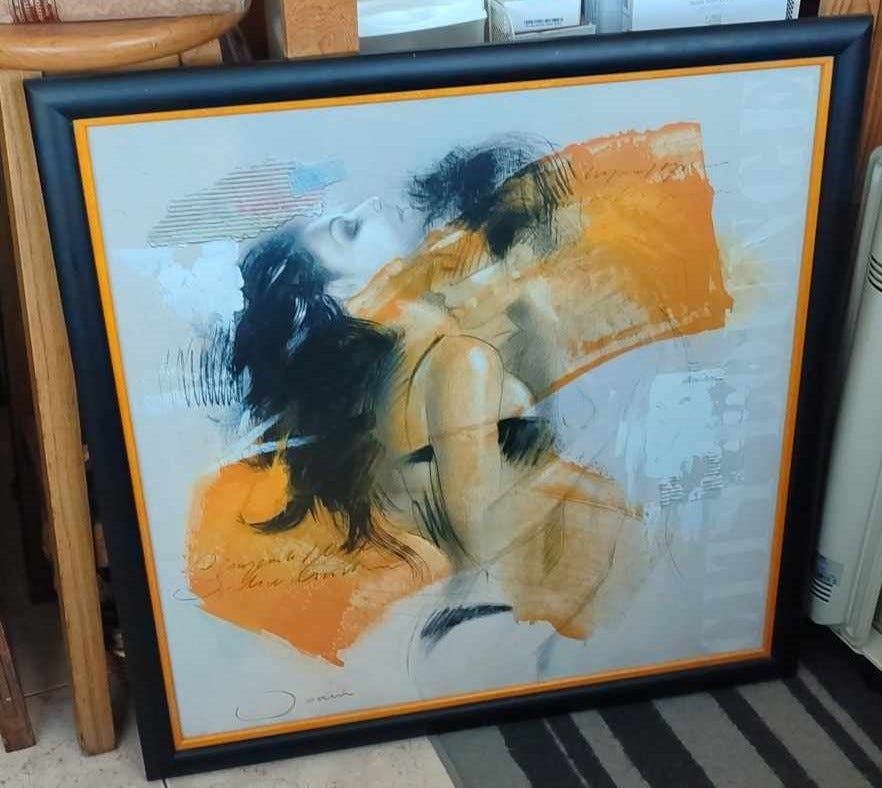Earlier this week, my girlfriend found this painting in the trash while walking home.
She brought it with her because… well, because "one man’s trash is another woman’s treasure", I guess. Only in this case, it’s not—it’s really trash.
To be fair, I admit I’m biased. We've had this conversation so many times that whenever she rescues some abandoned item from the streets, I automatically start complaining.
This happens more often than I’d like because her artist's eyes see things I don’t. What to me is a piece of used furniture someone threw away, to her, is a raw piece of decoration awaiting its unique unveiling.
It’s not that I can’t appreciate home décor—I geek out over “writer’s corners” and “home libraries.” But I prioritize efficiency over aesthetics. I’m not a savage, just lazy, and a cluttered house demands more cleaning and upkeep.
That’s why the Marie Kondo living rent-free in my head is always screaming, "DECLUTTER!" I keep nagging my girlfriend, insisting we should get rid of stuff, not bring home more, because "less is more."
She silently counters by reducing the number of “romantic” moments for the rest of the week—a strong argument for the "less is less" team, I admit.
Anyway, in all fairness, the painting is garbage, but the frame is good, and that’s what she wanted.
The Subjective of Value
Let’s focus on the real issue here: the perceived value of stuff. Perceived value is the worth someone assigns to an object, often differing from its intrinsic value.
Supply and demand often come to mind, but personal experiences, cultural backgrounds, and individual preferences also play significant roles in how we value things.
That's why an old sweater can be someone's favorite piece of clothing because it belonged to their late mother, or why a couple of sheets of paper are the first thing I would save from a fire.
Future expectations also factor into assessing value. That frame will soon hold something amazing created by my girlfriend, making our walls more valuable.
And then I’ll get that “told you…” look from her.
Leaving the physical level
What about intangible things?
Can actions be interpreted differently by different people?
Is a performance good or bad depending on who’s watching it?
Are my stories “great” to my girlfriend but “crappy” to everyone else?
Does my girlfriend have refined taste? (Oh, I know the answer to this one: yes, she does!)
Of course, our emotional connection with the work or its author influences our appreciation, but I believe there are universal frameworks that bring order to this “appreciation spectrum.”
This idea was reinforced after reading
‘s amazing essay about this topic.As he puts it, “Quality isn’t subjective, it’s statistical.”1
So yes, subjectivity allows for nuances, but there’s common ground for what is good or bad.
Good taste is cultivated. It grows as you feed it with diverse materials to evaluate, just as your work improves the more you create.
When we consume more of something, we improve our ability to critique it.
When we create more, we improve our chances of producing better work, not because of the quantity but because of the path we’ve walked to achieve it.
Conclusion
The moral of the story? Not entirely sure. Having one is part of the common ground of a good essay, but I’m walking the path, and this piece is just another step on my journey. So bear with me.
-Danny
📒My week
I’m using Notes a lot more, not as a “growth tactic”, but because I’m enjoying interacting with other writers and discovering great work, like this and this.
I’ve shifted my writing focus. While I’m into personal growth and productivity, I don’t think I can add much value to the field. I’m more of a consumer than a producer. What I can offer in abundance is sarcasm, stupid jokes, and self-deprecating humor, all sprinkled with self-appreciative falsehoods. So, expect lots of those in the future.
📷Photo of the week
It’s surprisingly hard to take a good photo of a chicken running past you in the street. But it’s even harder to figure out why there’s a chicken running past you in the street.
I had the good fortune of seeing Michael doing his thing while editing essays, and it’s out of this world. His “editor turned into software” project is super exciting, I can’t wait to see it in action. You should all subscribe to Essay Architecture.







Great!!!! 🎯